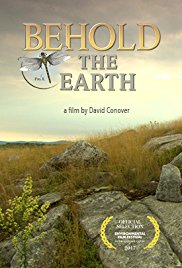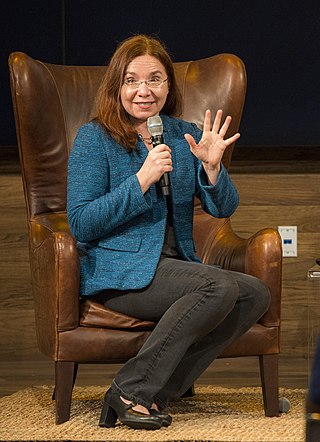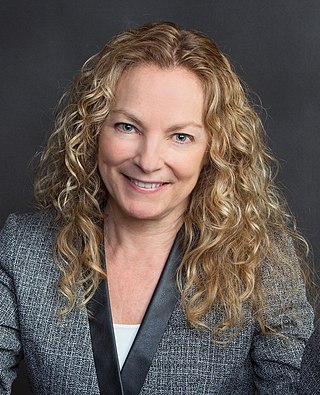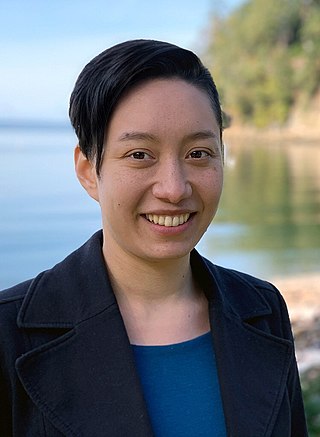
Stephen Henry Schneider was Professor of Environmental Biology and Global Change at Stanford University, a Co-Director at the Center for Environment Science and Policy of the Freeman Spogli Institute for International Studies and a Senior Fellow in the Stanford Woods Institute for the Environment. Schneider served as a consultant to federal agencies and White House staff in the Richard Nixon, Jimmy Carter, Ronald Reagan, George H. W. Bush, Bill Clinton, George W. Bush and Barack Obama administrations.

The Commonwealth Club World Affairs of California is a non-profit, non-partisan educational organization based in Northern California. Founded in 1903, it is the oldest and largest public affairs forum in the United States. Membership is open to everyone.

Stefan Rahmstorf is a German oceanographer and climatologist. Since 2000, he has been a Professor of Physics of the Oceans at Potsdam University. He studied physical oceanography at Bangor University and received his Ph.D. in oceanography from Victoria University of Wellington (1990). His work focuses on the role of ocean currents in climate change. He was one of the lead authors of the IPCC Fourth Assessment Report.

Ian William Chubb is an Australian neuroscientist and academic, who was the Chief Scientist of Australia from 23 May 2011 to 22 January 2016.

The Office of Science and Technology Policy (OSTP) is a department of the United States government, part of the Executive Office of the President (EOP), established by United States Congress on May 11, 1976, with a broad mandate to advise the President on the effects of science and technology on domestic and international affairs.

The President's Council of Advisors on Science and Technology (PCAST) is a council, chartered in each administration with a broad mandate to advise the president of the United States on science and technology. The current PCAST was established by Executive Order 13226 on September 30, 2001, by George W. Bush, was re-chartered by Barack Obama's April 21, 2010, Executive Order 13539, by Donald Trump's October 22, 2019, Executive Order 13895, and by Joe Biden's February 1, 2021, Executive Order 14007.

Naomi Oreskes is an American historian of science. She became Professor of the History of Science and Affiliated Professor of Earth and Planetary Sciences at Harvard University in 2013, after 15 years as Professor of History and Science Studies at the University of California, San Diego.

Jane Lubchenco is an American environmental scientist and marine ecologist who teaches and conducts research at Oregon State University. Her research interests include interactions between the environment and human well-being, biodiversity, climate change, and sustainable use of oceans and the planet. From 2009 to 2013, she served as Administrator of NOAA and Under Secretary of Commerce for Oceans and Atmosphere. In February 2021, she was appointed by President Joe Biden to serve as deputy director for Climate and Environment in the White House Office of Science and Technology Policy.

Susan Solomon is an American atmospheric chemist, working for most of her career at the National Oceanic and Atmospheric Administration (NOAA). In 2011, Solomon joined the faculty at the Massachusetts Institute of Technology, where she serves as the Ellen Swallow Richards Professor of Atmospheric Chemistry & Climate Science. Solomon, with her colleagues, was the first to propose the chlorofluorocarbon free radical reaction mechanism that is the cause of the Antarctic ozone hole. Her most recent book, Solvable: how we healed the earth, and how we can do it again (2024) focuses on solutions to current problems, as do books by data scientist Hannah Ritchie, marine biologist, Ayana Elizabeth Johnson and climate scientist Katharine Hayhoe.

Climate crisis is a term that is used to describe global warming and climate change, and their effects. This term and the term climate emergency have been used to describe the threat of global warming to humanity and Earth, and to urge aggressive climate change mitigation and transformational adaptation.

Behold the Earth is a feature-length musical documentary film that inquires into America's estrangement from nature, built out of conversations with leading biologists and evangelical Christians, and directed by David Conover. The film made its debut at the 2017 DC Environmental Film Festival.
Climate Central is a nonprofit news organization that analyzes and reports on climate science. Composed of scientists and science journalists, the organization conducts scientific research on climate change and energy issues, and produces multimedia content that is distributed via their website and media partners. Climate Central has been featured in news sources such as The New York Times, the Associated Press, Reuters, NBC Nightly News, Time, National Public Radio, PBS, Scientific American, and The Washington Post.

Katharine Anne Scott Hayhoe is a Canadian atmospheric scientist. She is a Paul Whitfield Horn Distinguished Professor and an Endowed Chair in Public Policy and Public Law at the Texas Tech University Department of Political Science. In 2021, Hayhoe joined the Nature Conservancy as Chief Scientist.
Peter Kalmus is an American scientist and writer based in Altadena, California. He is a data scientist at NASA's Jet Propulsion Laboratory as an associate project scientist at UCLA's Joint Institute for Regional Earth System Science & Engineering.

Susan Joy Hassol is an American author and science communicator best known for her work around climate change. Hassol is the Director of Climate Communication and was the Senior Science Writer on the first three U.S. National Climate Assessments.

Scientists for Future (S4F) is an international environmental initiative founded by a group of scientists in Germany, Austria, and Switzerland in support of the student movement Fridays for Future (FFF).

Gregor Hagedorn is a German botanist and academic director at the Natural History Museum, Berlin.

Amita Kuttner is a Canadian astrophysicist and politician who served as the interim leader of the Green Party of Canada from November 24, 2021, to November 19, 2022. Kuttner first ran for office in the 2019 federal election, seeking a House of Commons seat as a Green candidate, followed by a run for Green Party leadership in 2020 following the election. They are the first transgender person and the first person of East Asian descent to lead a federal party in Canada.

The Climate Book is a collective non-fiction book by the climate activist Greta Thunberg. The original English edition was published in October 2022. Translations are published in languages including German, Spanish, Portuguese, Italian, French, Dutch, Swedish, Danish, Norwegian, and Polish.

















